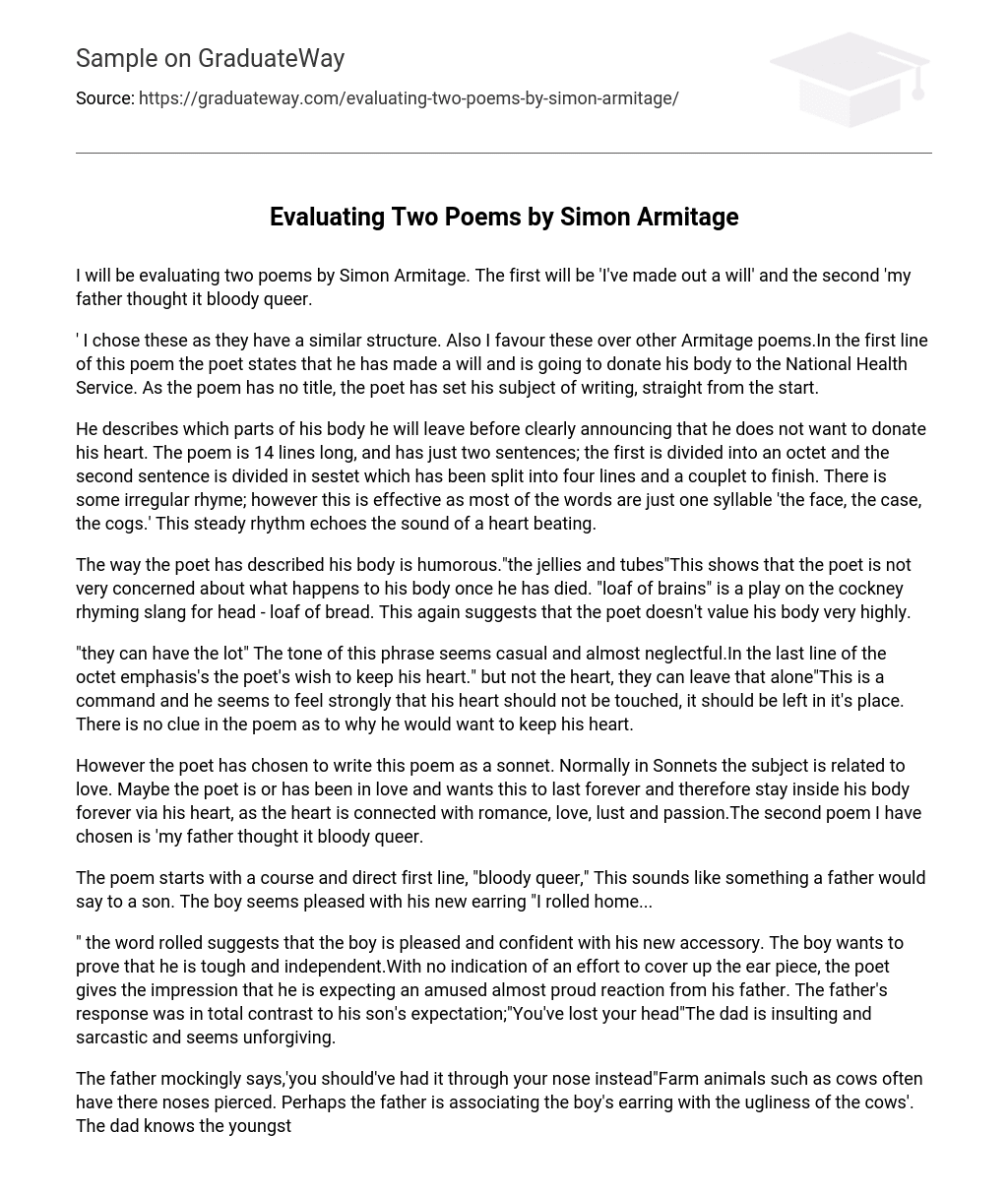There will be an assessment of two poems by Simon Armitage: ‘I’ve made out a will’ and ‘my father thought it bloody queer’.
The reason I chose these poems is because they share a similar structure and I prefer them over other poems by Armitage. In the opening line of this untitled poem, the poet reveals his decision to make a will and donate his body to the National Health Service, making it clear what he will be writing about.
The poem, consisting of 14 lines divided into an octet and a sestet, describes the author’s decision to not donate his heart. The first sentence is split into the octet, while the sestet is further divided into four lines and a couplet to conclude. Irregular rhyme is present with words like ‘the face, the case, the cogs,’ which adds to the steady rhythm that resembles a beating heart.
According to the poet’s humorous description, his body is referred to as “the jellies and tubes”, indicating his lack of concern for what happens to it after death. The phrase “loaf of brains” is a clever play on cockney rhyming slang for head, specifically “loaf of bread”, further emphasizing the poet’s low valuation of his body.
The tone of the phrase “they can have the lot” is casual and neglectful, implying a disregard for possessions. The poet emphasizes his wish to keep his heart in the last line of the octet with the command “but not the heart, they can leave that alone.” It is clear that he feels strongly about not wanting his heart to be touched and believes it should remain untouched. The poem does not provide any explanation as to why he feels this way about keeping his heart.
However, the poet decided to write this poem as a sonnet, which is typically associated with love. It is possible that the poet is or has been in love and desires for this feeling to be eternal, remaining within their heart. This is because the heart is often linked to romance, love, lust, and passion. The second poem I have selected is titled ‘my father thought it bloody queer.
The poem begins with a blunt and straightforward opening line, “bloody queer,” which resembles a remark that a father might make to his son. The young boy appears to be happy about his newly acquired earring as he exclaims, “I rolled home…
“The use of the word ‘rolled’ conveys the boy’s satisfaction and self-assurance regarding his new item. The boy’s intention is to demonstrate his strength and self-reliance. By not concealing the earpiece, the poet implies that he anticipates a response from his father that is lighthearted and possibly approving. However, the father’s reaction sharply contradicts the son’s expectation: ‘You’ve lost your head.’ The father’s words are insulting and sarcastic, indicating a lack of forgiveness.”
The father cynically proposes that the boy should have opted for a nose piercing instead, drawing a comparison to farm animals like cows who often sport pierced noses. This insinuates that the father views the boy’s earring as unattractive, akin to a cow’s piercing. Recognizing that the young boy will eventually come to regret it, the poet illustrates how the earring was attached.
“Despite the earring being fitted as carefully and cleanly as possible with a jeweller’s gun, it still manages to cause chaos between father and son.”
The word “wept” in the last line of the second stanza has both a literal and metaphorical meaning. Literally, it implies piercing, potential bleeding, or infection. Metaphorically, it reflects the emotional state of the boy and his father. In the concluding stanza, the poet nostalgically reflects on his own past while expressing admiration for his father. It seems that he is passing on to his son the same advice he once received from his father by stating “If I were you, I’d take it out and leave it out next year.”
The poem depicts the dynamics between parents and children, particularly highlighting the son’s attempt to assert his independence and the father’s disapproval. The speaker in the poem compares his own hesitant behavior with others who bravely pierce their own ears with needles. The boy is faced with a dilemma – removing the earring would acknowledge his mistake in putting it in, but leaving it in would mean disobeying his father and potentially leading to more conflicts in the future.
Both poems share similarities in their form, being sonnets. The initial poem adheres to a conventional structure comprising 14 lines, whereas the second poem slightly deviates by containing 15 lines. However, despite this discrepancy, both poems effectively communicate a powerful message. The first poem underscores the importance of love and passion, emphasizing that they should never be overlooked or forsaken regardless of any circumstances.
Both poems highlight the significance of comprehending and valuing diverse perspectives. At first, one might disagree with another person’s choice, but by placing oneself in their position, a fresh outlook can be obtained. The two poems share a seamless rhythm and a cheerful tone. In the initial poem, unconventional portrayals of the poet’s physique are utilized, while in the second poem, consistent rhyming improves its fluidity.





